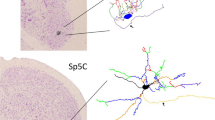Abstract.
The effect of age on the plastic response of vibrissal barrel cortex to deprivation was examined in adolescent (1 month at the start of the procedure, 2 months at testing) and mature (10- to 11-month-old) mice. A single vibrissa was plucked out for 3 weeks and allowed to regrow for 10 days; it was previously found that this deprivation paradigm induces strong downregulation of the deprived input. The results of deprivation were assessed with 2-deoxyglucose functional brain-mapping autoradiography. Deprivation was found to reduce the ability of the deprived vibrissa to activate the cortex both in adolescent and mature mice. However, while in young animals the decrease of the extent of cortical labeling, compared with the normal control, was observed in all examined cortical layers (II/III, IV, and V), in older mice the effect was reduced in layers II/III and absent in layer IV. The suppression of response of the infragranular layers was not affected by age. Transition from adolescent to mature adulthood brings about a layer-specific decline in depression of the cortical response to the deprived input.
Similar content being viewed by others
Author information
Authors and Affiliations
Additional information
Electronic Publication
Rights and permissions
About this article
Cite this article
Skibinska, A., Glazewski, S., Fox, K. et al. Age-dependent response of the mouse barrel cortex to sensory deprivation: a 2-deoxyglucose study. Exp Brain Res 132, 134–138 (2000). https://doi.org/10.1007/s002210000341
Received:
Accepted:
Issue Date:
DOI: https://doi.org/10.1007/s002210000341




